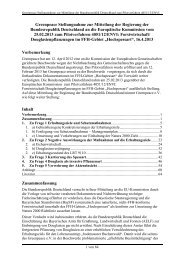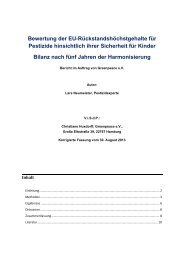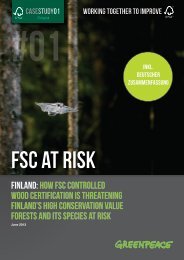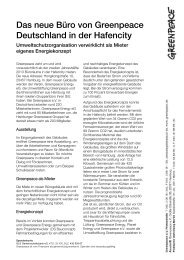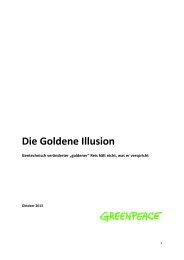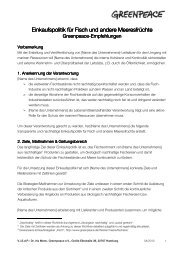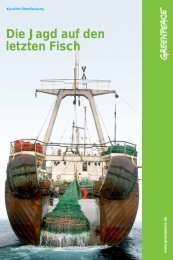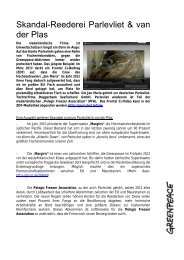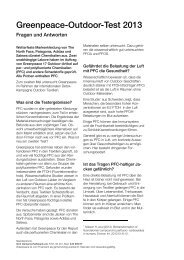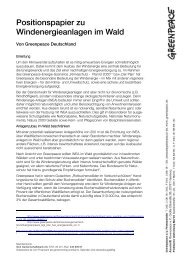Untitled - Greenpeace
Untitled - Greenpeace
Untitled - Greenpeace
You also want an ePaper? Increase the reach of your titles
YUMPU automatically turns print PDFs into web optimized ePapers that Google loves.
CARVING UP THE CONGO 35<br />
three years) by the Congolese National<br />
Investment Promotion Agency. 163 The stated<br />
aim of Trans-M’s exemption was to aid<br />
purchase of forestry equipment for Trans-M’s<br />
Befale logging title in the CBFP Maringa-Lopori-<br />
Wamba landscape in Equateur Province. 164<br />
Timber from Trans-M is imported into<br />
European countries, including Belgium, France<br />
and Germany. 165 Danzer (through its trading<br />
branch Interholco) has been a European<br />
importer of Trans-M timber. 166 Among the<br />
timber Trans-M supplies to Europe is<br />
afrormosia, commonly used in furniture and<br />
flooring – afrormosia is listed under Appendix<br />
II of the Convention on International Trade in<br />
Endangered Species (CITES) (see p53).<br />
ITB GETS ITS LOGGING<br />
TITLES THANKS TO FRIENDS<br />
IN HIGH PLACES<br />
The World Bank has promoted the value of its<br />
reform strategy – including the moratorium<br />
and new Forestry Code. These measures,<br />
however, rest in files in Kinshasa with no onthe-ground<br />
reality. In the absence of on-theground<br />
institutional capacity, the continuation<br />
of legal abuses seems inevitable.<br />
In the list of logging titles presented for legal<br />
review, there are two titles belonging to the<br />
Lebanese company Industrie de Transformation<br />
de Bois (ITB) 167 which fall on the border of the<br />
CBFP Lake Tumba landscape area of Equateur<br />
Province, covering together some 294,000<br />
hectares. These two titles appear to have been<br />
obtained in breach of the moratorium. ITB did<br />
have a title 168 in Equateur Province before the<br />
moratorium entered into force, but the two<br />
titles that are now up for legal review are<br />
located in a different area and cover a larger<br />
area of forest.<br />
Both in Kinshasa and in the small logging town<br />
of Bikoro near Lake Tumba, <strong>Greenpeace</strong><br />
became aware of rumours that a former highranking<br />
forestry official facilitated ITB’s gaining<br />
control of these forest holdings. When<br />
<strong>Greenpeace</strong> spoke to the chief forester (chef<br />
de chantier) for ITB at Bikoro, he openly<br />
admitted that it was ‘thanks to’ this official<br />
that ITB had come to Bikoro. 169<br />
Because the maps of pre- and postmoratorium<br />
titles are not publicly available, it is<br />
impossible for <strong>Greenpeace</strong> to make a definite<br />
assessment of which logging titles are in<br />
violation of the moratorium. Purely based on<br />
the current list of 156 logging titles now up for<br />
legal review, however, all titles in Bikoro date<br />
from after the moratorium, and thus are<br />
apparently in violation of both the moratorium<br />
and the Forestry Code. This includes logging<br />
titles held by ITB, the Congolese company<br />
LEDYA, 170 the Portuguese-managed company<br />
Sodefor 171 and the French-controlled<br />
Scibois, 172 which is logging in an area with<br />
significant primary forests and of great<br />
importance for bonobo conservation. 173<br />
In October 2006, <strong>Greenpeace</strong> also spoke to<br />
two government officials in charge of rural<br />
development and environment and forestry at<br />
Bikoro. They confirmed that local authorities<br />
have very little capacity – they have one<br />
building for all the different government<br />
services and no modern office equipment.<br />
They have no car or a motorcycle to visit the<br />
logging operations in the field (to check<br />
boundaries of annual allowed cut-blocks,<br />
minimum tree diameters, etc). Moreover,<br />
agents are very poorly paid and have not<br />
received sufficient training to enable them to<br />
detect forest crime or enforce forest law. They<br />
have no GPS or mapping software (nor the<br />
expertise to operate such equipment), and lack<br />
the know-how to estimate timber volumes on<br />
outgoing log barges. 174 Forestry officials also<br />
lack clear knowledge of the Forestry Code or<br />
the moratorium.<br />
ITB’s chief forester at Bikoro confirmed that<br />
officials rely on the information that the<br />
logging companies hand over to them and are<br />
incapable of conducting an effective<br />
independent inspection:<br />
‘When the forestry official visits our logging<br />
site … he comes to our office asking us to<br />
provide him with the figures on declared<br />
production volumes. They are not capable of<br />
verifying these things themselves … they don’t<br />
know how to measure, they don’t know how<br />
to identify wood species, really they don’t<br />
know where to start. The inspections here<br />
make me laugh; these people really need<br />
training.’ 175<br />
©<strong>Greenpeace</strong>/Davison



